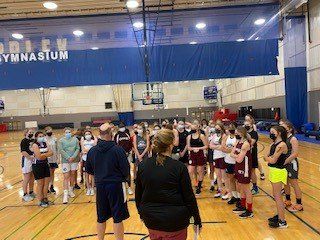What is your Coaching Philosophy?
Doug Partridge • December 3, 2019
Charting a course for how you will coach
Much is made of coaches needing to have a philosophy to guide them, but little is out there that really helps a coach consider what actually goes into a philosophy. Usually, the surface is barely scratched and style of play questions are offered up as philosophy. Do you play fast or slow? Physically or with finesse? What parts of the game do you emphasize? All of these things are important to consider, but are they really a philosophy? You most certainly do need a style of play, but you just as importantly need to understand the beliefs that underpin what you are trying to accomplish. Why are you in this business? What do you have to do to be successful? What is success? These fundamental questions are what truly defines a person's philosophy. Many coaches choose to believe that the sole role of a coach is to win games. They settle into a comfortable rut of running the same systems year after year and, if the talent is right, they pile up a great number of victories. In the end, the connection to their athletes is transitory and their impact potentially forgotten if they imparted nothing to their athletes but that system and a few victories. Taking time to consider the deeper elements of coaching, I believe, allows a coach to have a stronger and more lasting connection to their athletes.
The other important consideration, for the formation of one's philosophy, is your own underlying belief system. For me, the central theme is that all true knowledge is ancient knowledge. When you read and study extensively in ancient works, and particularly eastern philosophy and religion, you can gain an understanding of things that can be very beneficial in a sporting venue. The western world paints a certain picture for people about what is valuable and that picture is reinforced in almost every image or thought we are presented with. If you coach in a team atmosphere, this can prove very challenging. Take the notion of freedom. In the western world we are taught that freedom is the right to self-expression. That individuals need to be able to express themselves, whether verbally, through body art, or whatever means necessary. Relinquishing that right is seen as damaging or negative. Eastern, or ancient knowledge, paints a very different picture. True freedom is instead the ability to release one's individual needs and submerge oneself in a group. If I am willing to forgo my own desires and wants and instead place the good of the group in front of myself, then I can truly be free. The release from desire, especially for things we do not control, gives us the ability to express ourselves totally and be our best selves. After early ages, when fun is king, there are many athletes who stay involved in sport because they crave recognition, playing time, status or championships. The simple fact is that most athletes do not control these elements. It behooves an athlete to release these desires and embrace the fact that the above elements are not yours to decide. You just play, not for what you receive, but because it is "you" to play. Being one with your sport, where the pure love and enjoyment that comes from participating is your main motivation, is a difficult state to attain, but once there, it is the most enjoyable and fulfilling.
Bruce Lee spoke often about the "non-graspiness of being." Not always seeking to be something or attain something, but instead living in the "now." Living in the now is the ability to see every event not in a "law of averages" type of conglomeration, but as a separate event. Trying to control events can lead to anxiety and poor performance, while just trusting your preparation and flowing through events allows for an unblocked performance. Anxiety is a result of grasping for things we do not control or attempting to live outside our limitations. If you do not know, or accept, your role, then you will seek to change it, or try to control situations you do not have control over. One can seek to improve themselves and their situation while simultaneously accepting their limitations and working to create their best self within them. If you are not grasping for what is out of your reach, it is easier to more honestly judge your performance. Many athletes in the current world base their own assessments on what they wish to accomplish and not on what they actually do. In the words of Yoda, "there is no try, only do or do not." Your assessment as an athlete is not whether you are trying, but whether you are accomplishing. If you are not graspy, then you can see more clearly what you are actually doing and what you must accomplish to be successful in whatever role the group needs you to fulfill. Finally, you can also see how fulfilling that role can bring you joy.
If this is the basis of my philosophy, then we can see how the first step for me down the road to coaching is getting my athletes to buy into the need to submit themselves to the team. For them to get enjoyment through the success of the whole first and that their own role, however big or small, brings satisfaction for being done well. It is important to have this over-riding ethos in place so that every other decision that is made can flow from it. Once you have a "vision", so to speak, for your coaching career, you then need a "mission": What are we emphasizing on a day to day basis with our athletes? What are our non-negotiables? What does every athlete need to be willing to do to succeed or find a home in my program? It is always fascinating to see how many coaches have not considered these points before. In attending a coaching clinic this past summer, I heard Jay Triano, a national team coach, a two time NBA head coach, talk about how at the age of 61 years, he was just documenting his core values as a coach. It is vital to any coach who is trying to format their philosophy to understand these core values or non-negotiables and even more importantly document them.
I have always believed in the power of three; three key ideas, three statements, three rules. Three is a good number. It is about what people can remember off the top of their head. For this reason, I try to limit these types of processes to three key elements. For me, my three core values are:
1. Timeliness - this is the most important. All you are given in this world is time, and you want to make sure that you do not waste it. Players and coaches need to be early to events, practices, meetings and games. A person who is late holds all the others as hostages. Will the coach be upset? Will there be a problem? It causes a lot of stress. Being timely eliminates all that drama. Furthermore, we only have a certain amount of time together to work on things. Do not waste that time with poor effort, bad execution, or a lack of caring. Make use of the time we have to learn and improve.
2. Discipline - be in control, make good decisions, discipline yourself in all things. Not just in your play, but how you carry yourself, your work/study, nutrition. All elements should bring with it the desire to be better. Make sure that you are mindful of others and control yourself in all situations. This has been one of the great struggles of my life and I have tried to learn from it and ensure that others do not head down a path that is not productive.
3. Passion - be all in, bring love and joy to what you do and best energy to your pursuits. Do not merely show up and go through the motions. Be enthusiastic about what you are doing and the opportunities that are in front of you.
For me, my over-all philosophy starts with the need for people to be in the now, and release their desires for personal gain. We are a team and you need to submit yourself to the team. The combination of being in the now and releasing your desires will help you find a happier more enjoyable sporting experience. Once you are willing to buy into the immediacy of what we are doing, then we are governed by three principles: timeliness, discipline and passion and those that can bring these traits will be more successful in our program.
From here, your next step on this journey is to take the time away from other concerns to make sure that you write out, and you have a strong understanding of your over-all philosophy, as far as basketball and life goes. What are your core principles? What do you expect of your athletes? This exercise will be invaluable and will allow you and your athletes to be on the same page, creating a more harmonious team and a better platform from which to have success.
Share this Post
Show More

